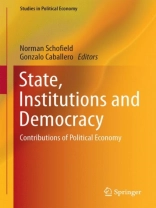This book presents a set of original and innovative contributions on state, institutions and democracy in the field of political economy. Modern political economy has implied the interaction between politics and economics to understand political, electoral and public issues in different nations, and in this volume a group of leading political economists and political scientists from Europe, America and Asia provides theoretical advances, modelling and case studies on main topics in political economy.
The analysis of the role and performance of politics and democracy in diverse nations implies the study of the organization of the state, lobbying, political participation, public policies, electoral politics, public administration and the provision of public services. This book provides advances in the research frontier of these topics and combines historical evidence, institutional analysis, mathematical models and empirical analysis in an interdisciplinaryapproach. Political and social scientists, economists and those interested in the performance of states, democracy and elections can find new research results in this volume.
สารบัญ
PART I: BARGAINING, LOBBYNG AND STATE CAPTURE.- Bargaining with Outside Options.- Lobbying mechanisms.- Financial Sector Regulation and the Revolving Door in US Commercial Banks.- PART II: DEMOCRACY, PARTICIPATION AND ELECTORAL POLITICS.- The Rhetoric and the Reality of Austerity – Electoral Politics in Britain 2010 to 2015.- Valence and Ideological Proximity in the Rise of Nationalist Parties: Spanish General Elections, 2008 and 2011.- Measuring Direct Democracy.- Political Participation in Rural India: A Village Level Study.- Elections with international relations dominance.- Electoral rules and proportionality in Spain: Estimating the impact of some Swedish rules through the 2011 electoral data.- PART III: STATE AND PUBLIC SERVICES.- Is there a Doctor in the House?.- What makes people nursing home residents – individual need or municipalities’ supply?.- Civil Service and the Crisis: A comparative analysis of Iberian Countries (2008-2013).- PART IV: CASES OF INSTITUTIONAL CHANGE.-Congressional negotiations with costly voting: Understanding the reforms to PEMEX in 2006-2008.- Institutional change, specific investments and photovoltaic power plants: The empirical effects of the energy policy of solar farms in Spain.- The economic effects of the implementation of the Greek Adjustment Plan in the Great Recession.- E-procurement and innovation in the Portuguese municipalities: when change is mandatory.












